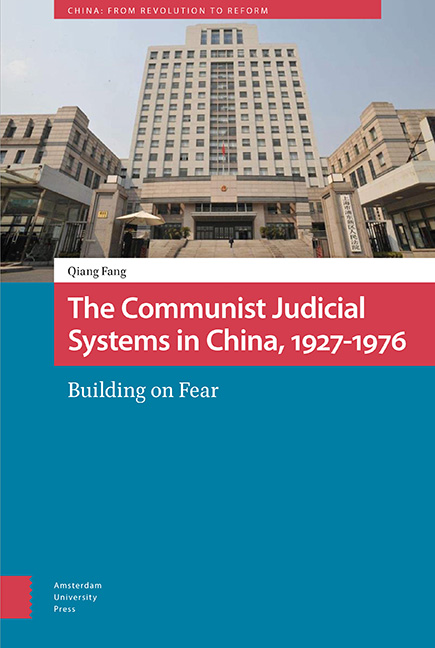Book contents
- Frontmatter
- Contents
- List of Tables
- Dedication
- Acknowledgement
- Acronyms
- Introduction: Building on Fear
- 1 Born in Blood: Origin of the Communist Judicial System in China, 1927–1935
- 2 Cornerstone or Aberration?: The Communist Judicial System during Wars with Japan and the GMD, 1936–1949
- 3 From “Excessive Lenience” to Harshness: The Communist Judicial System in the Early PRC, 1949-1952
- 4 A Deliberate Purge: Legal Reform in the Early PRC, 1952-1953
- 5 A Golden Age?: The Communist Judicial System in China, 1953-May 1957
- 6 The Great Leap of Law: The Communist Judicial System in China, 1957-1965
- 7 Not the Worst Period of Law: The Communist Judicial System in the Cultural Revolution, 1966-1976
- Conclusion: From Party’s Fear to People’s Fear
- Bibliography
- Index
5 - A Golden Age?: The Communist Judicial System in China, 1953-May 1957
Published online by Cambridge University Press: 18 June 2021
- Frontmatter
- Contents
- List of Tables
- Dedication
- Acknowledgement
- Acronyms
- Introduction: Building on Fear
- 1 Born in Blood: Origin of the Communist Judicial System in China, 1927–1935
- 2 Cornerstone or Aberration?: The Communist Judicial System during Wars with Japan and the GMD, 1936–1949
- 3 From “Excessive Lenience” to Harshness: The Communist Judicial System in the Early PRC, 1949-1952
- 4 A Deliberate Purge: Legal Reform in the Early PRC, 1952-1953
- 5 A Golden Age?: The Communist Judicial System in China, 1953-May 1957
- 6 The Great Leap of Law: The Communist Judicial System in China, 1957-1965
- 7 Not the Worst Period of Law: The Communist Judicial System in the Cultural Revolution, 1966-1976
- Conclusion: From Party’s Fear to People’s Fear
- Bibliography
- Index
Summary
Abstract
As the Korean War neared its end, the Communist judicial system pendulum began swinging to the right (liberal side) and reached its apogee in the fall of 1954 with the promulgation of the first Constitution and the Organic Law of the Court. Many scholars in China and the West therefore claim that the years between 1953 to 1957 were a “golden age” of the PRC. In fact, this chapter argues that, with the exception of a short period from spring 1956 to early summer of 1957, this period was not much different from others. The widespread abuses of law, the use of torture, and the meting out of excessive punishment in the second anti-counterrevolutionary campaign of 1955-1956 was almost as bad as the first one of 1951. Even after the Party called for righting the wrongs in 1956, official infringement of the law persisted in remote counties.
Keywords: limited golden age, 1954 constitution, Organic Law of the People's Court, Gao Gang, Hu Feng incident, lenience in Spring of 1956
While many scholars have expressed an interest in the legal system and its development in the early PRC, most have provided only fleeting and tangential coverage of the period between the Legal Reform Movement (1952-1953) and the Anti-Rightist Movement (1957). For example, Chen Shouyi simply mentions the achievements of the 1954 constitution and the revival of jurisprudence around 1956. Other scholars have mostly centered their research on the political campaigns, abuses of law, and labor camps in this period, and they do not heed the Party's shift of policy toward lenience and legal professionalism in 1956 and 1957. There are some scholars who tend to regard the legal developments between 1953 and 1957 as consistent and smooth without treating the dynamic policy changes during and after the 1955 anti-counterrevolutionary movement. But they hail the period 1953-1957 as a “Golden Age” during which the Chinese legal system was arguably at its best before 1976.
Hou Songtao wrote in 2008 that the three to four years after the 1952 legal reform were a “Golden Age” in legal construction, which had previously been mainly “propelled” by the “needs” of the Chinese Communist Party (CCP) to consolidate its political power and social reform.
- Type
- Chapter
- Information
- The Communist Judicial System in China, 1927–1976Building on Fear, pp. 179 - 214Publisher: Amsterdam University PressPrint publication year: 2021



